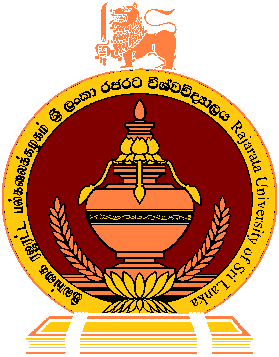Rajarata University of Sri Lanka (RUSL) was established on the 7thof November 1995 under Section 21 of the Sri Lanka universities Act No. 16 of 1978 by amalgamating the resources of the Affiliated University Colleges in the Central, North Western and North Central Provinces. The main University is located in Mihintale, a world heritage site, 17 km from the city of Anuradhapura, once a well known center of learning, several centuries before the beginning of the Christian era.Currently, the University has five faculties – Faculty of Applied Sciences, Faculty of Management Studies and the Faculty of Social Sciences and Humanities located in the main campus in Mihintale, Faculty of Agriculture in Puliyankulama, and the Faculty of Medicine and Allied Sciences in Saliyapura.
The Faculty of Medicine and Allied Sciences was established in July 2006 as the eighth public medical faculty of Sri Lanka. The first batch of 171 medical undergraduates from 22 districts of the island was enrolled in 2006 and graduated in 2012. At present, Faculty of Medicine and Allied Sciences is the third largest medical faculty in Sri Lanka in terms of number of medical graduates trained per year.
First research publication with FMAS name on it was in 2008 and since then, researchers from FMAS have widely engaged in research activities. To facilitate the research activities among researchers from FMAS, as well as from North Central Province, Ethics Review Committee (ERC), Faculty of Medicine & Allied Sciences (FMAS), RUSL, was first established in 2009. It was initially established as Research and Publication Committee (RPC). Inaugural meeting of RPC was held on the 20th of May 2009 and Prof. D.J. Weilgama was the first Chairperson. At the beginning, it consisted of seven academic staff members of the faculty. Name of the committee was changed to Research Publication and Ethics Review Committee (RPERC), at the second meeting of RPC in October 2009. In addition to research ethics review, reviewing applications of awardees of RUSL and organizing CME programmes were done by the RPERC. Name of the committee was changed to Research, Ethical Review and Higher Degrees Committee (RERHDC) as a part of major reform of the RPERC that was done in October 2011. Higher degree related activities were added to the scope of the committee with these reforms. Moreover, membership was widened to 16 and full documentation practices were established as a part of these reforms. Prof. Sisira Siribaddana was the first Chairperson of the reformed committee. In October 2013, RERHDC was separated into two committees based on their functions as Ethics Review Committee (ERC) and Higher Degrees Research and Publication Committee (HDRPC). Since then, ERC has been functioning as an independent body devoted for ethics review. It has been a recognized ethics review committee by the Ministry of Health, Sri lanka, since 2013. In May 2017, ERC was accredited by the Subcommittee on Clinical Trials (SCOCT) of the National Medicines Regulatory Authority (NMRA), Sri lanka as the seventh ERC in Sri Lanka which can review and approve clinical trials. Further, it has been accredited by SIDCER-FERCAP.
The first edition of the Standard Operating Procedures (SOP) and Terms of Reference (TOR) were developed in 2013. Second edition was effective in 2016 February onwards. Third edition of SOP and TOR were approved in August 2016. Third revision of the SOP was started in August 2017, based on SIDCER-FERCAP recommendations that were made after the site visit, as a part of SIDCER-FERCAP recognition to the ERC. Fourth edition of the SOP was developed as a self-sufficient document to cover all the functions of the ERC, combining with the important points in TOR.
The primary objectives of the ERC/FMAS/RUSL is to protect the physical, psychological, social welfare, rights, dignity and safety of human participants used in research, while taking into account the interests and needs of researchers and the integrity of FMAS/RUSL. The ERC facilitates ethical research through efficient and effective review and monitoring processes, to promote ethical standards of human research and to review research in accordance with the Guidelines of the Forum of Ethics Review Committees in Sri Lanka (FERCSL Guidelines) and relevant national and international guidelines.


